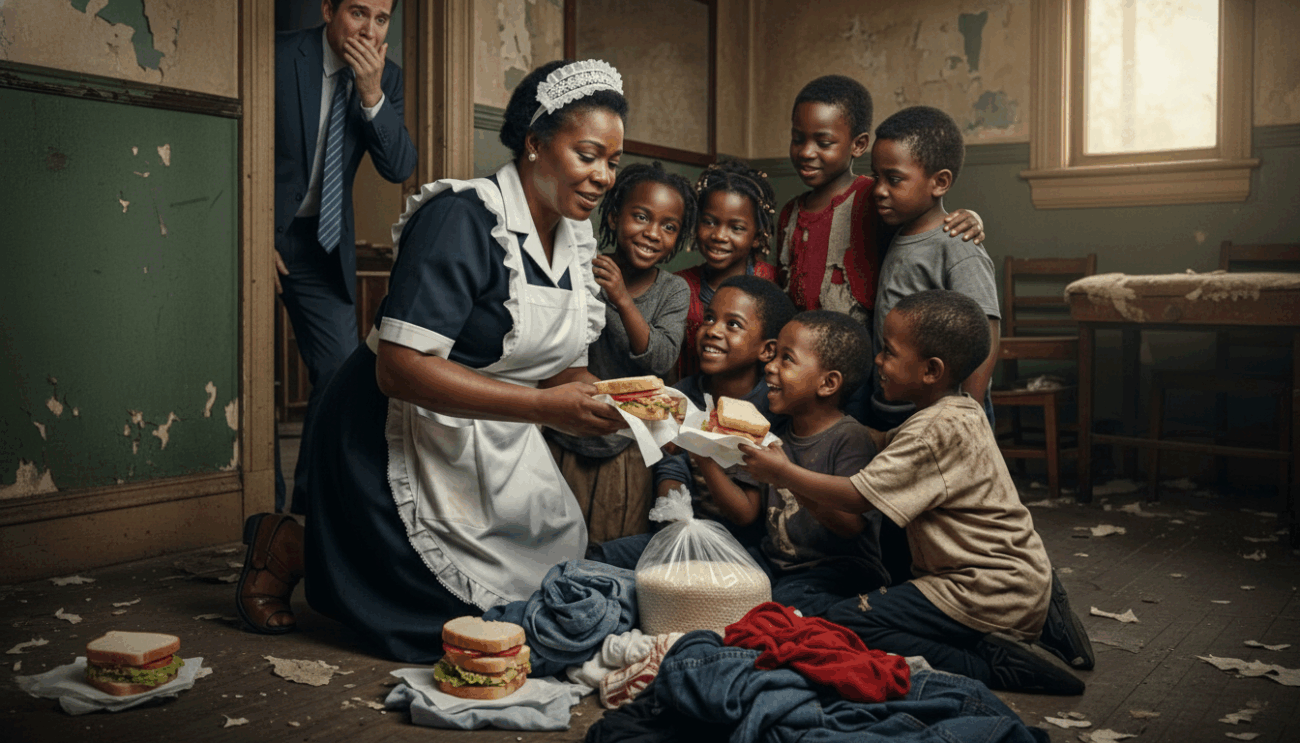Richard Harrison was a man both admired and feared. A self-made millionaire in New York, he had built his business empire through relentless ambition and uncompromising decisions. His penthouse gleamed with steel and glass, his wardrobe reflected success, and his schedule was filled with meetings that influenced markets. Behind this wealth, however, Richard lived an isolated life, raising his nine-year-old daughter, Emily, after a bitter divorce.
In his home, one presence was constant: Margaret Brown, Emily’s Black nanny. At fifty-two, Margaret was warm, patient, and endlessly gentle with the child. She braided Emily’s hair, read her bedtime stories, and comforted her during nightmares. Richard believed he compensated her fairly and regarded her as simply part of the household staff.
But over time, he noticed unusual details. Margaret frequently skipped meals and took food home instead. She wore worn-out shoes, a coat patched at the elbows, and never spent money on herself. Suspicious by nature, Richard assumed she was mishandling her income or hiding something.
One cold evening, his doubts overwhelmed him. After Margaret left, Richard put on a dark coat, got into his car, and followed her through the city. He expected to confirm his suspicions—perhaps gambling, perhaps giving money to someone inappropriate.
What he witnessed instead left him devastated.
Margaret did not stop at a home but walked into a deteriorating brick building with a faded sign reading Hope Community Center. Inside, dozens of children rushed toward her, calling out “Mama Margaret!” She handed out wrapped sandwiches, bags of rice, second-hand clothing, and notebooks. She knelt to tie a child’s shoelaces, kissed a baby’s forehead, and embraced a trembling teenager.
Richard stood frozen at the door. The food she had taken from his house was not for herself—it was for those children.
That night, for the first time in years, the millionaire felt tears in his eyes. While he had spent his life pursuing profit, a woman with nothing had been giving everything.
The following morning, Richard could not focus on business calls. Numbers blurred, and deals seemed insignificant. He saw only the faces of the children at the center and Margaret carrying the weight of so many lives.
When she arrived at work, Richard asked her to meet him in his study. She entered cautiously, expecting criticism. He cleared his throat, uncharacteristically uneasy.
“I followed you last night,” he said.
Margaret stiffened. “Sir, I—”
He raised a hand. “No. I saw everything. The food, the clothes, the children. Margaret, why didn’t you tell me?”
She looked down. “Because it isn’t your burden. Those children have no one. If I can give them a little warmth, a little hope, I must. I could never spend my salary on luxuries knowing they go to bed hungry.”
A knot formed in Richard’s throat. “You’ve been skipping meals, wearing torn shoes, just so they can eat.”
She smiled gently. “Mr. Harrison, money is only paper. Love and kindness—those are what children remember. Emily has everything. I wish the others had even half.”
For a long moment, Richard said nothing. He had closed multimillion-dollar deals without hesitation, yet now words failed him. Finally he murmured, “I thought I was the one giving you a salary. It turns out you’re the one giving me something priceless.”
That evening, he surprised Emily by telling her they would visit Margaret’s “special place.” At the Hope Center, Emily played with the children, sharing crayons and laughter. Seeing his daughter’s joy, Richard realized how much he had denied both of them by living solely for wealth.
On the way home, Emily leaned against him and said, “Dad, Margaret’s kids are wonderful. Can we help them more?”
He squeezed her hand. “Yes, sweetheart. We’re going to help them much more.”
Weeks later, the old community center was gone. In its place stood a modern, bright building with classrooms, a playground, a library, and a cafeteria. Above the entrance, engraved in bold letters, were the words: Margaret Brown Academy.
At the inauguration ceremony, Margaret was speechless as hundreds of children cheered for her. Richard stepped forward with Emily at his side. “This woman,” he said, “taught me that real wealth is not in bank accounts but in the lives we touch. She gave when she had almost nothing. Today, it is an honor to contribute in her name.”
Margaret cried as she cut the ribbon. For the first time, her quiet acts of compassion were recognized not just by the children she cared for, but by an entire city.
The Academy became a beacon of hope. Children who once had no future now learned in safe classrooms. Volunteers from across New York came to help. Each evening, Margaret continued to walk the halls, comforting children and reminding them they mattered.
Richard’s life changed as well. He still ran his company, but his priorities shifted. He spent afternoons at the Academy reading to children, mentoring teenagers, and showing Emily the power of compassion. The man once known for being ruthless now found his reputation tied to kindness.
One evening, as the sun set behind the new Academy, Margaret sat on a bench while Richard and Emily handed out books. She wiped her eyes and whispered, “I never imagined a life like this.”
Richard sat beside her. “Neither did I. You taught me what it means to be truly wealthy.”
In the end, he understood: wealth was not the penthouse, the cars, or the bank accounts. Wealth was seeing his daughter laugh with children once forgotten, and knowing that because of Margaret, his legacy would be measured in love.




